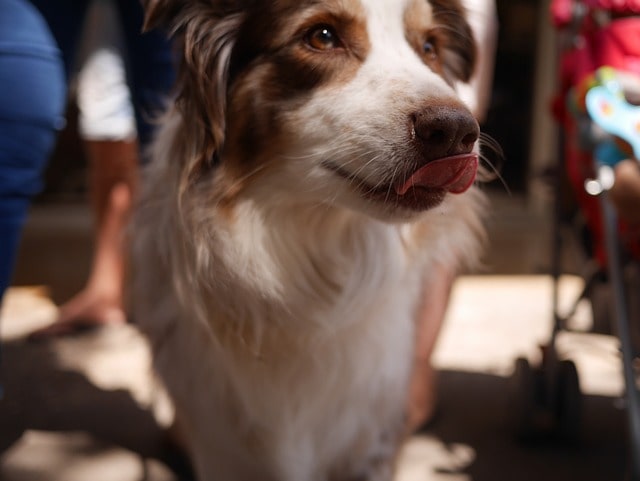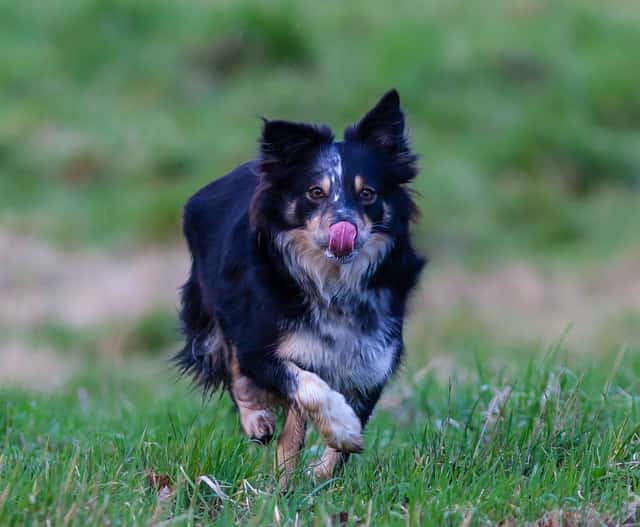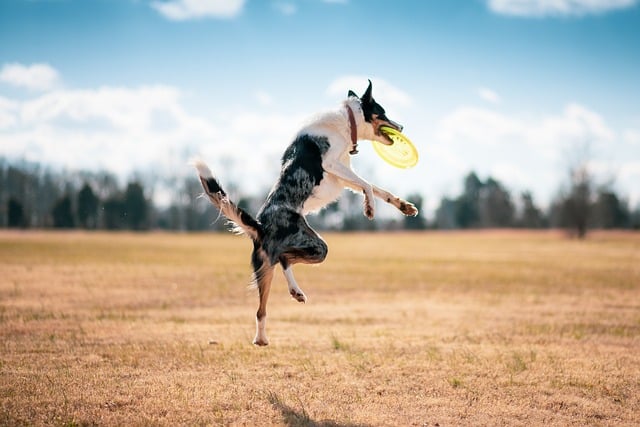Numerous Border Collie enthusiasts know that upon entering their homes, their canine companions eagerly await to offer a greeting akin to a kiss. While most dogs engage in some degree of licking, Border Collie owners frequently observe their dogs as exceptionally enthusiastic. What prompts Border Collies to engage in such extensive licking?
Why Do Border Collies Lick You?
Border Collies, renowned for their intelligence and herding instincts, exhibit licking behavior for various reasons, providing valuable insights into their emotional states and interactions. This instinctual behavior can be a multi-faceted communication tool for these dogs.
Licking is a versatile indicator of Border Collies’ emotions. It reflects affection when they lick their owners, stress or boredom when they engage in excessive licking and potential allergies when they target specific areas. The act of licking also triggers the release of endorphins, providing a soothing and therapeutic effect to a self-soothing mechanism.
Moreover, Border Collies may employ licking to assert dominance when interacting with other canines. This behavior can be an essential component of their social hierarchy dynamics. When these dogs show affectionate licks on their human companions, it could be due to a genuine fondness, but it may also be linked to their attraction to the salt on human skin. Understanding these various facets of licking behavior can help owners better connect with and care for their beloved pets.
Top Reasons a Border Collie Will Lick You

Like most dogs, Border Collies have a natural inclination to lick, and this behavior serves various functions deeply ingrained in their instincts. One primary purpose of their licking is to convey affection and seek attention from their human counterparts. When a Border Collie licks you, it’s their way of expressing love and forming a stronger bond with you.
Moreover, licking can also serve as a form of communication, as dogs use their sense of taste and smell to gather information about their environment and the people around them. It’s their way of learning about the world. While occasional licking is perfectly normal, it’s essential to be mindful of its frequency and intensity.
Excessive or compulsive licking can sometimes signal underlying issues like anxiety, discomfort, or even a medical problem.
Therefore, it’s crucial to monitor your Border Collie’s licking habits and consult a veterinarian or a professional dog trainer if you suspect it has become problematic.
Border Collies’ licking behavior can be of many things where it could be a means of affection, communication, and information gathering. While generally harmless, it’s essential to pay attention to any excessive or compulsive licking to ensure the well-being of your furry friend.
They Seek Sensory Input
Border Collies, lacking the skill of hands, rely heavily on licking as a fundamental means of engaging with their environment. This behavior can be likened to their way of “touching” the world, serving to gather information about objects and individuals through direct physical contact. Without hands, a Border Collie’s tongue becomes a versatile tool for exploration.
By licking objects or people, they extend their sensory reach to understand better what they encounter. This tactile interaction enables them to collect vital data about various items’ texture, taste, and scent, helping them decode their surroundings and establish connections with the world.
They are Showing You Affection or Expressing Submission
Many individuals who enjoy sharing their lives with Border Collies often perceive their dogs’ habit of licking them as a demonstration of affection and closeness. This typical behavior in Border Collies and dogs, in general, is often attributed to feelings of warmth and attachment towards their human companions. It’s a heartfelt way for these intelligent and devoted dogs to express their emotions and strengthen the bond they share with their owners.
When your Collie licks you, it could also signify their submissive behavior, rooted in their ancestral connection to wolves. In the context of wolf packs, the dominant members would receive tokens of respect and honor by being licked by their subordinates. In the case of your Collie, this licking gesture serves as a way for them to communicate their deference and loyalty to you, acknowledging your role as the leader of their “pack.”
This behavior highlights the intricate social dynamics among canines, drawing parallels between your domesticated Collie and its wild wolf ancestors. Through this act of licking, your Collie is expressing affection and reinforcing the bond and hierarchy within your shared household, affirming your position as the respected leader. It’s a fascinating insight between canine behavior and their evolutionary heritage.
Your Border Collie needs Your Attention
Border Collies stand out prominently in the canine world for their extraordinary intelligence. Among the vast array of dog breeds, they are consistently recognized as some of the smartest companions. What sets them apart is their remarkable intellect and their knack for understanding human behavior.
One fascinating aspect of Border Collies’ intelligence is their ability to perceive cause and effect in their interactions with their owners. These clever canines quickly learn that their act of licking, a behavior they naturally exhibit as a sign of affection or curiosity, elicits a strong response from humans. When they realize that licking garners attention and affection, they are inclined to employ this behavior to capture our focus persistently.
Their cognitive prowess allows them to learn, adapt, and refine this tactic. Thus, they become particularly adept at seeking our attention through the repeated and endearing act of licking. This demonstrates the unique bond and understanding that Border Collies can develop with their human companions, making them highly intelligent, incredibly charming, and affectionate pets.
They are Trying to Gauge Your Mood

Border Collies, like many other dog breeds, possess an extraordinary sense of smell that far surpasses that of humans. While their sense of taste may not be as refined as ours, it remains highly developed. Moreover, dogs have a remarkable ability to observe and assess human emotions. When these sensory abilities are combined, they enable dogs to gauge a person’s emotional state.
Dogs can perceive the chemical changes in our bodies as we produce pheromones. Therefore, when you’re feeling sad, anxious, or stressed, even a simple act like a dog licking you can serve as a signal to the dog that something isn’t quite right with your emotional state.
You Taste Good
Have you ever noticed that your dog tends to shower you with affectionate licks, particularly after physical exertion, often concentrating on areas where you’ve sweated profusely? This intriguing behavior can be linked to the composition of our sweat, which includes salt and acidic compounds that dogs find oddly enticing. Dogs are innate to salty tastes, and the unique scent of human sweat, possibly intensified during exercise, could be a sensory delight.
Furthermore, your furry friend’s licking may extend to your face and hands to gather information about your recent activities. Dogs possess an incredible sense of smell, allowing them to detect faint traces of the food you’ve consumed or the pleasant fragrances from moisturizing creams and lotions you’ve applied. This behavior is a sign of their affection and a testament to their remarkable sensory abilities, reinforcing the special bond between you and your four-legged companion.
You Border Collie is Showing Empathy
Your cherished canine companion may be licking you for a profound reason – to express empathy, especially when it perceives that you are under stress or feeling down. Dogs possess an astonishing knack for detecting shifts in human emotional states, and in response, they exhibit a range of empathetic behaviors. They will often draw near to you, tenderly lick your hands and face, and may even emit soft whines, all in an earnest attempt to provide solace and demonstrate their understanding of your emotions.
In these moments, dogs strive to alleviate your sadness and offer comfort. Their ability to display empathy extends to their owners, other dogs, and even unfamiliar individuals. This remarkable trait is one of the critical reasons therapists recommend dogs as therapy and emotional support animals. The innate capacity of dogs to tune into human emotions and respond with gestures of empathy underscores the profound bond between humans and their four-legged companions.
Hungry
When your dog begins air or lip licking right before mealtime, it indicates their heightened anticipation for food. This behavior is a fascinating insight into their instincts and senses. It’s not just restricted to scheduled meals; you may notice it when cooking something particularly appetizing, like roast chicken wafting through the kitchen, or even after sharing a delectable sticky treat such as peanut butter.
This anticipatory behavior can be attributed to a combination of factors. Firstly, dogs have an incredible sense of smell, and they can detect the aroma of food from a considerable distance. The olfactory stimulation triggers their salivary glands, resulting in lip licking. Additionally, dogs are highly responsive to routine, so mealtime rituals become ingrained habits for them.
Understanding these cues can deepen your bond with your furry friend and help you cater to their excitement and needs, making mealtime a delightful experience for you and your dog.
Something Hurts or Itches
Excessive licking in dogs can significantly indicate underlying discomfort, especially in our beloved older canine companions. This behavior is more than just a casual habit; it often signifies that your furry friend is experiencing physical pain or discomfort. Much like humans instinctively massage a sore muscle or rub an achy joint, and dogs turn to licking to alleviate their discomfort.
This innate behavior stems from their natural inclination to address any form of physical distress, whether an external injury like a cut or an internal ailment such as joint pain. Dogs believe that licking a painful area can somehow cleanse it or promote healing.
Dog owners must pay close attention to excessive licking, as it can be an early warning sign of health issues that may require veterinary attention. By recognizing and addressing the root cause of their discomfort, we can ensure our loyal companions lead a happier and healthier life as they age.
Your Border Collie is just being a Dog
Licking behavior in dogs is deeply ingrained in their evolutionary history and social instincts as pack animals. Dogs have retained many of their wild ancestors’ behaviors, including grooming one another by licking. When dogs interact with their human companions, they often extend these natural tendencies, treating us as if we were part of their pack. This results in the common phenomenon of dogs excessively licking their owners, sometimes leaving them covered in saliva.
Why Do Border Collies Lick My Hand?
Border Collies are known for their propensity to lick hands, a behavior that is often interpreted as a simple display of love and affection. However, this seemingly straightforward act carries many underlying meanings, shedding light on the intricate world of canine communication. These motivations encompass:
- Instinctive Pack Behavior: Dogs, including Border Collies, have a strong instinct to form and reinforce social bonds within their pack. Licking can be a way for them to display respect and loyalty to their human family members, mirroring their natural pack behavior.
- Puppyhood Reminders: Licking can harken back to a nurturing instinct developed during puppyhood. It’s a way for them to seek attention, comfort, or nourishment from their human companions, much like they did from their mother.
- Grooming Instinct: Dogs might also lick hands as a form of grooming. This action can indicate care and affection, or in some cases, it may be an attempt to clean or heal minor wounds due to the mild antibacterial properties in their saliva.
Understanding these motivations behind a Border Collie’s licking behavior can help decipher their message and strengthen the bond between owners and their beloved canine companions. It’s a reminder that every lick is a form of canine communication beyond a mere display of love.
Why Does a Border Collie Lick The Carpet?
Border collies and other dogs often lick surfaces like carpets and floors. This behavior can have multiple underlying causes, some benign and others potentially indicating more severe issues.
One possible reason for excessive licking in dogs is stress or anxiety. Signs of focus may include panting, drooling, changes in ear and lip expressions, growling, barking, or whimpering. Consulting a veterinarian is advisable if a dog displays such signs.
Health problems can also lead to compulsive licking, which may extend to the dog licking its paws or body. Specific gastrointestinal issues like giardiasis, pancreatitis, or delayed gastric emptying have been linked to this behavior. Treating these health concerns can reduce obsessive licking.
Giardiasis, caused by a parasitic infection in the intestinal tract, can result in symptoms like weight loss, lethargy, vomiting, and diarrhea. Pancreatitis, a severe pancreatic condition, can lead to fatigue, loss of appetite, difficulty breathing, vomiting, and diarrhea. Delayed gastric emptying, where food doesn’t move correctly through the digestive system, can cause belching, weight loss, and a reduced appetite.
Boredom is another potential cause of excessive licking, especially in high-energy breeds like Border Collies. Providing exercise and engaging activities can help mitigate this behavior.
Lastly, separation anxiety can lead to obsessive licking as it may release endorphins in the dog’s brain, helping them cope with being apart from their owners. This cycle of licking and endorphin release can reinforce itself.
Why Do My Border Collies Lick Their Paw?
Border Collies may lick and bite their paws for various reasons, and it’s crucial to understand these causes:
- Allergies: Like humans, Border Collies can suffer from allergies triggered by substances like pollen, dust, or specific foods. Excessive paw licking may be a sign of an allergic reaction. Consult a veterinarian to identify and address the underlying allergen. Some owners find relief by providing natural allergy supplements, like fish oil or quercetin.
- Skin Infections: Border Collies, especially those spending much time outdoors, can develop skin infections caused by bacteria, fungi, or parasites. Paw licking may be an attempt to alleviate itching or irritation. Prompt veterinary evaluation and treatment are essential for such cases. Minor offenses can sometimes be relieved with chlorhexidine wipes.
- Anxiety or Stress: Border Collies are sensitive to environmental changes and can develop anxiety or stress due to various factors, such as moving to a new home, introducing a new pet, or weather changes. Paw licking may signal their discomfort. Address the root cause of stress and consider using tools like broad-spectrum Hemp oil or calming chews to help alleviate anxiety.
- Boredom: These active dogs require plenty of exercise to stay happy and healthy. Insufficient physical activity can lead to boredom, resulting in behaviors like paw licking. Ensure your Border Collie receives enough exercise through walks, playtime, and interactive toys to prevent boredom-induced behaviors.
Why are they Licking And Chewing Their Fur?
Like many dogs, Border Collies may exhibit occasional behaviors like fur chewing or scratching their ears with their hind paws in response to normal itchiness. These actions can be benign and are often a way for them to alleviate discomfort. Nevertheless, it becomes a matter of concern when these behaviors lead to significant fur loss. Several underlying factors can contribute to this issue.
Environmental and food-related allergies are common triggers for excessive scratching and chewing in dogs. Skin problems like dermatitis or fungal infections may also provoke these behaviors. Insect or parasite bites can cause intense itching, prompting your Border Collie to groom excessively. Moreover, stress and anxiety can manifest in such behaviors as a way for your dog to cope.
Recognizing the root cause of your Border Collie’s fur loss is crucial for appropriate intervention.
Consult with your veterinarian to pinpoint the issue and develop a tailored treatment plan to ensure your beloved pet’s comfort and well-being.
Is it okay if my Border Collie licks my face?

Allowing your dog to lick your face ultimately boils down to personal preference. While it is generally considered safe, there are specific considerations to remember. A dog’s lick is unlikely to pose any significant harm to most healthy individuals. Human mouths tend to harbor more potentially harmful microorganisms than those of dogs.
Nonetheless, it’s crucial to exercise caution, particularly if you have a weakened immune system or an open wound. In such cases, the risk of infections can be heightened due to the transfer of bacteria from your dog’s mouth. Dogs can carry specific parasites and diseases in their mouths, such as hookworms, ringworms, and salmonella. While the likelihood of transmission to humans is relatively low, it is not entirely impossible.
To maintain a healthy balance between the affectionate bond with your furry friend and your well-being, consider your health status and your dog’s hygiene, and take appropriate precautions when sharing those slobbery kisses.
Excessive Licking of Border Collies
Excessive or inappropriate licking by your dog can raise several concerns and should not be dismissed lightly. This behavior can manifest in various forms, whether your dog is licking you, itself, or different objects excessively. While occasional licking is ordinary, persistent and obsessive licking can indicate underlying issues that require attention.
One common reason for excessive licking is boredom. Dogs, like humans, need mental stimulation and physical activity to stay engaged and content. They may resort to compulsive behaviors like excessive licking when they lack these. Anxiety is another potential cause, and dogs may use licking to self-soothe. Allergies can also lead to itching and licking as your dog attempts to relieve discomfort.
It is crucial to consult your veterinarian when you observe such behavior in your dog. They can conduct a thorough evaluation to determine the root cause and recommend appropriate treatment or behavioral interventions. Addressing these underlying issues improves your dog’s well-being and strengthens your bond with your furry companion.
Is there anything Serious when my Border Collie is excessively licking?
Excessive licking in your Border Collie is a behavior that warrants close attention, as it may signify underlying health or psychological concerns. This habit can be more than just a quirky behavior and could point to various potential issues. One possible cause of excessive licking in dogs is anxiety, which can manifest in this repetitive action as a coping mechanism. Allergies, including food or environmental sensitivities, may also trigger excessive licking due to itchiness or skin irritation.
Additionally, gastric reflux or digestive problems could lead to discomfort, prompting your dog to lick to alleviate the issue. Dry skin is another common culprit, as it can cause irritation and prompt your Border Collie to lick excessively. Lastly, obsessive-compulsive disorder may be the cause, especially if the licking is compulsive and doesn’t serve a clear purpose.
To pinpoint the root cause, pay attention to when and where your dog licks most frequently, and consult with a veterinarian for a thorough evaluation and appropriate treatment if needed. Early identification and intervention can ensure your Border Collie leads a happy, healthy life.
Your Border Collie could be Anxious
Border Collies, known for their intelligence and high energy levels, frequently resort to licking as a source of comfort. This behavior serves as a coping mechanism to combat boredom and anxiety. When your Border Collie licks you, it’s their way of self-soothing and seeking reassurance. It’s crucial to address the underlying causes to reduce this behavior effectively.
One approach is to provide them with alternative activities and mental stimulation to alleviate their boredom. Interactive toys, puzzle feeders, and obedience training sessions can engage their active minds and divert their attention from excessive licking. Additionally, ensuring regular exercise and playtime will help burn off excess energy, reducing the need for self-soothing behaviors like licking.
Moreover, reinforcing positive behaviors with treats and praise when your Border Collie refrains from excessive licking can encourage more desirable conduct. Consistency and patience are key when modifying any behavior, and understanding the reasons behind your Border Collie’s licking will lead to a happier and healthier relationship with your furry companion.
You Border Collie could be Craving for Food
Excessive licking in dogs can be a multi-faceted issue, often acting as a subtle yet crucial indicator of underlying health concerns. One potential explanation for this behavior is a nutritional deficiency. If your dog is incessantly licking, it may signify that they lack essential nutrients in their diet. This could imply hunger, even if they’ve consumed adequate food, as their body craves specific vitamins or minerals it’s missing.
Your Border Collie might want Your Help with Something
When your Border Collie starts licking you, paying attention is essential, as this behavior can signify a range of needs and emotions. One common reason for licking is hunger. Your dog may be trying to communicate that it’s mealtime or snack time, hoping to get your attention for a tasty treat.
Another possible reason is the need for a bathroom break. Licking can be a sign of anxiety or discomfort related to holding in their waste, and your dog might be asking you to let them outside to relieve themselves.
Your Border Collie may just need some Space
Licking is a complex dog behavior that extends beyond mere hygiene or taste. Beyond grooming themselves or expressing curiosity, dogs employ licking to convey emotional messages and maintain social bonds with their human companions.
One significant aspect of licking is its role in reassurance. When a dog licks you, it can signal their desire to communicate non-threatening intentions. In such instances, it is important to interpret this behavior correctly. Your dog may be expressing their need for personal space or comfort. It’s advisable to respect their request and back off, allowing them the required space.
Pay attention to their body language and overall demeanor to enhance your understanding of your dog’s feelings. If your dog subsequently approaches you with a friendly head nudge or offers a gentle lick on your hand, it signifies their willingness to engage and interact positively. This mutual communication fosters a stronger bond between you and your furry friend while ensuring a comfortable and respectful relationship.
How to Stop Collies from Excessively Licking You?
To address your Collie’s excessive licking behavior, it’s essential to pinpoint its underlying cause. For instance, if your Collie licks primarily during meals or rest, focus on modifying those situations rather than attempting to change their behavior during playtime or other times. It’s also beneficial to monitor whether this obsessive licking occurs at particular times of the day or for specific durations.
Consider using positive reinforcement by rewarding your Collie when they refrains from licking. This will help them associate not licking with receiving rewards, making them more likely to change their behavior.
It’s worth noting that Border Collies, known for their exceptional intelligence and quick learning abilities, can adapt well to training.
Use this to your advantage when addressing excessive licking, and be mindful of your body language to communicate that this behavior is undesirable.
Ignore
One effective strategy to address your Border Collie’s excessive licking behavior is to ignore it initially. When your Border Collie licks you excessively, it is often a way of seeking attention or expressing their affection. By choosing not to react to their licking, you send a clear message that this behavior will not result in the attention they are seeking. This method requires patience, as it may take some time for your dog to understand that licking doesn’t yield the desired results.
Consistency is vital in implementing this approach. Be sure to remain steadfast in your non-reaction to licking, no matter how persistent your dog may be. Additionally, you can reinforce positive behaviors by offering affection and attention when your Border Collie is calm and not engaging in excessive licking.
Over time, your dog should learn that calm behavior is more likely to result in the attention and affection they crave, while excessive licking is discouraged. This approach promotes a healthier and more balanced interaction between you and your beloved pet.
Take Your Border Collie for a Walk

If your Border Collie is exhibiting signs of unhappiness stemming from a particular problem, it can manifest in obsessive behaviors that might be concerning. In such cases, it becomes imperative to address these issues proactively. One effective strategy is to ensure your furry companion receives ample exercise and mental stimulation. Regular walks and engaging activities can work wonders in redirecting their energy and alleviating their discontent.
Border collies, renowned for their intelligence and high energy levels, thrive on mental and physical challenges. Incorporating a consistent exercise routine into their daily life combats unhappiness and fosters positive and fulfilling behaviors. This approach contributes to your border collie’s overall well-being and is essential in improving their behavior.
By recognizing the unique needs of Border Collies and providing them with the right outlets for their energy and intellect, you can help your pet lead a happier, more balanced life.
Meet their Basic Needs
Meet your Border Collie’s fundamental needs through enrichment activities. If your dog tends to lick you excessively, redirect their attention by involving them in activities like food puzzles and enjoyable treasure hunts that stimulate their foraging instincts.
Additionally, consider entertaining your dog with engaging mental exercises, such as retrieving tennis balls from a muffin tin with hidden treats. Enrichment keeps your dog mentally engaged, encouraging independence, boosting confidence, and nurturing their mental well-being.
Use a Reward Approach to their Calm Behavior
There are two categories of rewards for dog training: intrinsic and conditioned. Intrinsic rewards are those that align with a dog’s natural desires as they fulfill their essential needs. These can include treats, playtime, or affectionate petting. On the other hand, conditioned rewards involve a signal that, through learning, becomes linked to food or enjoyable activities.
During training, this signal is frequently a sound, such as that produced by a clicker, or verbal praise like “good dog.” Establishing this connection between the signal and the reward enables precise communication with the dog about which behaviors are being rewarded.
This facilitates the dog’s rapid understanding of expectations, leading to more frequent rewards and a heightened eagerness to learn. It’s essential to periodically reinforce this association, meaning that after the signal is given, you should consistently or nearly always provide a reward to prevent your dog from disregarding the sign over time.
Use A Deterrent
Several effective strategies can be employed to discourage your pet from engaging in excessive licking or nibbling of their skin. One approach is to provide them with engaging and appropriate alternatives, such as Kong toys, Nylabones, or other dental chew toys.
These toys keep your pet mentally stimulated and provide a satisfying outlet for their natural chewing instincts.
Furthermore, for more persistent cases, physical deterrents can be helpful. No-lick strips, for instance, can be applied to specific areas your pet is targeting, providing an unpleasant taste that discourages further licking. E-collars, create a barrier around the pet’s neck, making it physically impossible for them to reach the problem areas. Additionally, you can use booties to cover paws or legs to prevent access to specific regions.
Provide Mental Stimulation
Just as dogs require physical exercise, they also need mental stimulation to maintain their overall well-being. A dog’s mind constantly processes information and seeks new challenges. Pet owners can play a crucial role in fulfilling this cognitive requirement by offering a variety of puzzle-solving tasks and playful activities that engage their dog’s mental faculties.
Mental stimulation is not merely a luxury; it’s an essential component of a dog’s life. Adequate cognitive engagement can significantly enhance a dog’s training progress, improving impulse control and reducing undesirable behaviors. This aspect of canine care is especially crucial for small dogs and puppies, as their cognitive abilities are still in the developmental stage.
Incorporating mental stimulation into your dog’s routine ensures their mental health and strengthens the bond between you and your furry companion. It’s a holistic approach to dog care that contributes to their happiness and overall well-being.
Should I allow my Border Collie to Lick Me?
Allowing your Border Collie to lick you can be a heartwarming expression of their affection and companionship. While it’s generally acceptable and even enjoyable to let your furry friend indulge in some licking, it’s important to maintain a balance. Excessive licking can lead to irritation or discomfort for you and may signal an underlying issue in your dog’s behavior or health.
When your Border Collie licks you sporadically, it often serves as a way to communicate their love, seek attention, or even alleviate mild boredom. In such cases, embracing a few licks is a natural part of the human-dog bond. However, it’s crucial to establish boundaries and ensure that the licking doesn’t become obsessive or intrusive.
Should your Border Collie’s licking escalate beyond the norm or become bothersome, it may be wise to consult a veterinarian or professional dog trainer to address any underlying issues, such as anxiety or compulsive behavior. Moderation and understanding your dog’s intentions are key to fostering a healthy, loving relationship with your Border Collie.
Does a Border Collie Lick more than other Dog Breeds?
Border Collies are often regarded as an affectionate breed known for their tendency to engage in licking behavior. This behavior stems from their unique ability to form profoundly strong connections with their human companions, leading them to seek closeness both in a physical and emotional sense, which they express through their affectionate licking.
How Do I Know what My Border Collie means when They Lick Me?
Like many other dog breeds, Border Collies engage in licking behavior for many reasons, creating a complex tapestry of intentions behind this action. Charlotte Huggins, an expert in canine behavior at the Dogs Trust, sheds light on the nature of this behavior. Dogs, including Border Collies, often lick humans to communicate. One primary purpose is seeking attention; when Border Collie licks you, they may try to garner your focus and affection. This can also serve as a greeting, showcasing their excitement and happiness upon seeing you.
Additionally, licking can be a way for dogs to explore and understand their environment. By licking your skin or clothes, they can gather information about various scents and tastes, helping them make sense of the world around them. Therefore, understanding your Border Collie’s specific motivation for licking requires careful observation and consideration of the context in which this behavior occurs.
Final Thoughts
Border Collies display a unique licking behavior that can vary among individuals, driven by different motivations. Firstly, they use licking as a form of communication and affection towards their owners, strengthening their emotional bond. Secondly, licking serves as a means of grooming, helping dogs maintain cleanliness and skin health. It also aids in exploring and gathering sensory information about their surroundings.
Excessive licking can signal underlying issues, such as anxiety or stress, requiring attention and support. Changes in licking patterns, mainly focused on specific areas, may indicate health concerns, necessitating a veterinarian’s evaluation.
To manage licking behavior, positive reinforcement training techniques can be effective in establishing boundaries and guidelines within the household. This ensures a harmonious relationship between Border Collies and their owners. Regular veterinary checkups are crucial to monitor overall health and address any concerns related to licking habits.
Border Collies’ licking behavior encompasses communication, grooming, and exploration, requiring careful observation by owners. Proper training techniques and veterinary care are essential for managing and understanding this behavior, ensuring the well-being of these intelligent and affectionate dogs.


